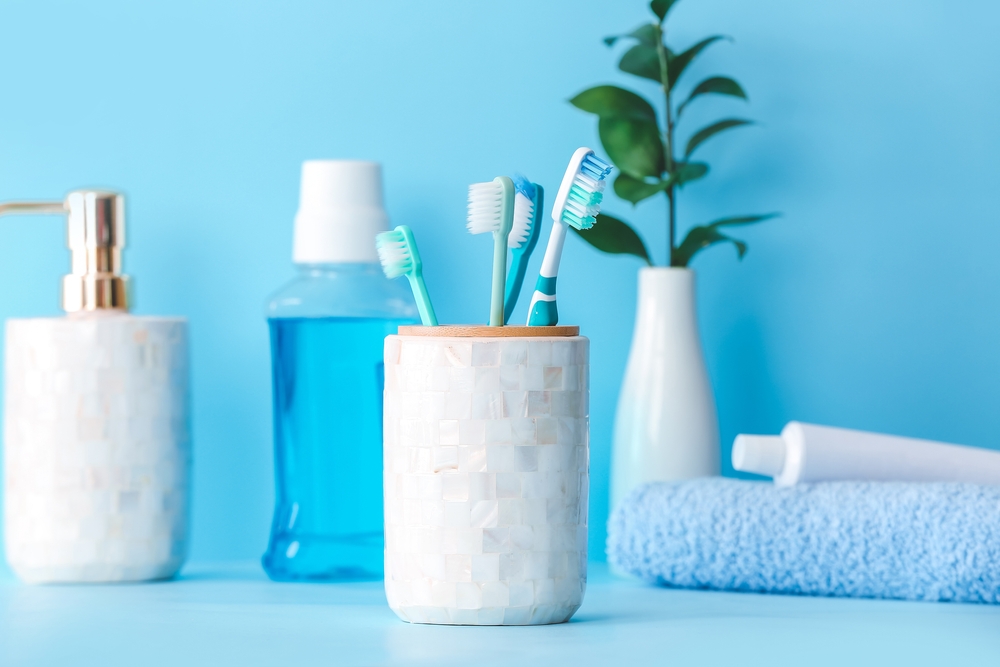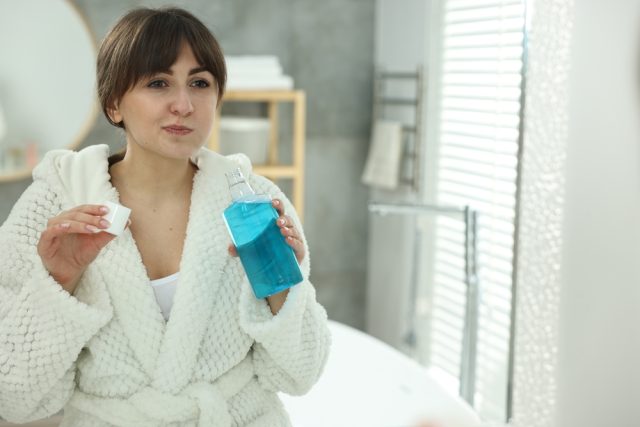Is Mouthwash Really Necessary? Our Littleton Dentist Explains
You’re standing in the oral care aisle, staring at rows of brightly colored bottles promising everything from “12-hour fresh breath” to “advanced gum protection.” With so many options and claims, it’s natural to wonder: Is mouthwash actually worth adding to your daily routine, or is it just another product marketed to solve a problem you don’t really have?
The truth is, mouthwash can be a valuable tool for oral health—but it’s not essential for everyone, and it certainly can’t replace the basics of good dental care. At Littleton Advanced Dentistry in Littleton, CO, Dr. Tom Bonbright and his team help patients navigate these questions every day. If you have questions about your oral care routine or would like personalized recommendations, call (720) 719-0012 to schedule a consultation with our dentist in Littleton.
What Is Mouthwash and How Does It Work?
Mouthwash, also called oral rinse or mouth rinse, is a liquid product designed to be swished around your mouth to improve oral hygiene and freshen breath. But not all mouthwashes are created equal—they generally fall into two main categories:
Cosmetic mouthwashes temporarily freshen breath and leave a pleasant taste but don’t offer therapeutic benefits. Think of these as breath mints in liquid form.
Therapeutic mouthwashes contain active ingredients that actually help prevent or treat oral health conditions like cavities, gingivitis, and plaque buildup.
The most common active ingredients you’ll find in therapeutic mouthwashes include:
- Fluoride – Strengthens tooth enamel and helps prevent tooth decay
- Antiseptics (chlorhexidine, cetylpyridinium chloride) – Kill bacteria that cause bad breath, plaque, and gum disease
- Essential oils (eucalyptol, menthol, thymol) – Provide antibacterial properties and fresh flavor
- Alcohol vs. alcohol-free formulations – Alcohol acts as a preservative and helps other ingredients dissolve, but alcohol-free versions are available for those with sensitivity or dry mouth concerns
While mouthwash can reach areas of your mouth that are difficult to access with a toothbrush, it’s important to understand that it works differently from brushing and flossing. Brushing physically removes plaque and food debris from tooth surfaces, flossing cleans between teeth where brushes can’t reach, and mouthwash delivers therapeutic ingredients throughout your entire mouth while reducing bacteria levels.
Benefits of Using Mouthwash
When used correctly and as part of a comprehensive oral care routine, mouthwash offers several legitimate benefits:
- Freshens breath effectively. Mouthwash reduces the bacteria that cause bad breath and leaves your mouth feeling clean and fresh. While this effect is temporary, it’s certainly welcome before important meetings or social situations.
- Reaches difficult areas. The liquid nature of mouthwash allows it to swish into spaces that brushing and flossing might miss, including around the gums, between teeth, and along the tongue.
- Prevents cavities with fluoride. Fluoride rinses deliver cavity-fighting minerals directly to your tooth enamel, providing an extra layer of protection against decay—especially beneficial for those prone to cavities.
- Reduces plaque and gingivitis. Antiseptic mouthwashes have been clinically proven to reduce plaque buildup and the gum inflammation that leads to gingivitis when used consistently over time.
- Offers convenience. A 30-second rinse is quick and easy, making it simple to add to your morning or evening routine without much time investment.
- Helps with specific dental situations. Mouthwash can be particularly valuable after oral surgery, for people with braces or other orthodontic appliances, or for those managing conditions like dry mouth.
- Provides psychological benefits. Many people simply feel more confident and comfortable with the clean sensation and fresh breath that mouthwash provides, which can encourage better overall oral hygiene habits.
Potential Drawbacks and Concerns
Despite its benefits, mouthwash isn’t without potential downsides:
- It’s not a substitute for brushing and flossing. This bears repeating: mouthwash cannot physically remove plaque and food particles the way brushing and flossing do. Using mouthwash alone will not maintain good oral health.
- Alcohol-based formulas may cause problems. Mouthwashes containing alcohol can dry out your mouth, which ironically may worsen bad breath over time and increase cavity risk. They can also cause burning or irritation for some users.
- It may mask underlying issues. Relying on mouthwash to combat persistent bad breath might prevent you from addressing the root cause, such as gum disease, tooth decay, or other health conditions that require professional treatment.
- Some ingredients can stain teeth. Certain antiseptic mouthwashes, particularly those containing chlorhexidine, may cause temporary tooth staining with long-term use.
- Cost adds up. While not prohibitively expensive, regular mouthwash use is an ongoing expense that may not provide significant additional benefit if your brushing and flossing routine is already excellent.
- Overuse may disrupt the oral microbiome. Your mouth contains beneficial bacteria alongside harmful ones. Excessive use of strong antiseptic mouthwashes might disrupt this balance, though research on this is still evolving.
- Not appropriate for young children. Children under six years old generally shouldn’t use mouthwash due to the risk of swallowing it, which can lead to ingestion of too much fluoride or other ingredients.
When Mouthwash Is Most Beneficial
Mouthwash isn’t necessary for everyone, but certain situations make it particularly worthwhile:
If you’re cavity-prone
People who frequently develop cavities despite good brushing habits can benefit significantly from daily fluoride rinses, which provide extra protection for tooth enamel.
For gum disease or gingivitis
If a dentist in Littleton has diagnosed gingivitis or early gum disease, an antiseptic mouthwash may be recommended as part of your treatment plan to reduce harmful bacteria and inflammation.
Following dental procedures
After oral surgery, tooth extractions, or other dental work, your dentist may recommend a specific mouthwash to promote healing and prevent infection.
With braces or orthodontic devices
When brushing and flossing become more challenging due to orthodontic appliances, mouthwash can help reach areas that are difficult to clean mechanically.
For limited dexterity
Individuals with arthritis, motor control issues, or other conditions that make thorough brushing difficult may find mouthwash helpful for maintaining better oral hygiene.
As part of comprehensive care
When added to consistent brushing and flossing, mouthwash can provide that extra level of protection and cleanliness—think of it as an insurance policy for your oral health.
With specific medical conditions
People undergoing radiation therapy, those with chronic dry mouth, or individuals with certain medical conditions may benefit from specialized therapeutic rinses.

When Mouthwash May Not Be Necessary
On the flip side, you might not need to invest in mouthwash if:
Your oral hygiene routine is already excellent
If you brush twice daily for two minutes with fluoride toothpaste and floss once daily, and your dental checkups consistently show healthy teeth and gums, mouthwash may offer minimal additional benefit.
You have mouth sensitivity
People with sensitive mouths, allergies to common mouthwash ingredients, or conditions like oral lichen planus may find mouthwash irritating rather than helpful.
You’re a parent of young children
Kids under six shouldn’t use mouthwash, and older children may not need it if they maintain good brushing and flossing habits under parental supervision.
You’re using it as a shortcut
If you find yourself skipping brushing or flossing because “I’ll just use mouthwash,” it’s time to rethink your approach—mouthwash can’t do the job of mechanical cleaning.
You need professional treatment
Persistent bad breath, bleeding gums, or other oral health concerns require attention from a dentist near you, not a bottle of mouthwash.
Dentist Recommendations and Best Practices
Dr. Tom Bonbright of Littleton Advanced Dentistry in Littleton, CO, emphasizes that while mouthwash can be a helpful addition to your oral care routine, the foundation of good dental health remains unchanged: “The most important things you can do for your oral health are brushing twice daily with fluoride toothpaste, flossing once daily, and visiting your dentist regularly for checkups and cleanings. Mouthwash should enhance these habits, not replace them.”
When selecting a mouthwash, consider these tips:
- Choose based on your needs. Look for fluoride rinses if cavity prevention is your goal, antiseptic formulas for gum health, or alcohol-free options if you experience dry mouth or sensitivity.
- Look for the ADA Seal of Acceptance. Products bearing the American Dental Association’s seal have been evaluated for safety and effectiveness, giving you confidence in your choice.
- Follow proper usage techniques. Use the amount directed (usually about 20ml or 4 teaspoons), swish vigorously for 30 seconds to one minute, and spit it out—never swallow mouthwash. Don’t eat or drink for 30 minutes after using a fluoride rinse to maximize its effectiveness.
- Time it right. Most dentists near Highlands Ranch recommend using mouthwash after brushing and flossing, though fluoride rinses can be used at a different time of day than brushing for maximum fluoride exposure.
- Don’t overdo it. Using mouthwash once or twice daily is typically sufficient. More isn’t necessarily better and may increase the risk of side effects.
- Consult your dentist. Your dental professional can recommend specific products based on your individual oral health needs, existing conditions, and treatment goals.
Take Action for Your Oral Health
Ready to optimize your oral care routine? Here’s what to do next:
- Evaluate your current habits. Are you brushing twice daily, flossing once daily, and visiting your dentist regularly? Start with these fundamentals.
- Consider your specific needs. Do you have frequent cavities, gum issues, or persistent bad breath? These factors might make mouthwash more beneficial for you.
- Schedule a dental checkup. Haven’t seen your dentist in a while? Now’s the time. A professional evaluation can identify any issues and help you develop a personalized oral care plan.
Littleton’s Approach to Modern Dentistry
If you have questions about whether mouthwash is right for you or want to optimize your oral care routine. In that case, Dr. Tom Bonbright and the team at Littleton Advanced Dentistry can provide straightforward answers based on your specific situation. We work with patients from Littleton, Highlands Ranch, Ken Caryl, and surrounding areas to develop practical dental care plans that fit real life. Call (720) 719-0012 to schedule a consultation and get personalized recommendations for your oral health from our dentist in Littleton, CO.
